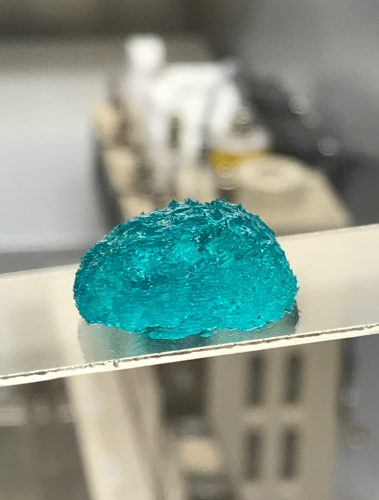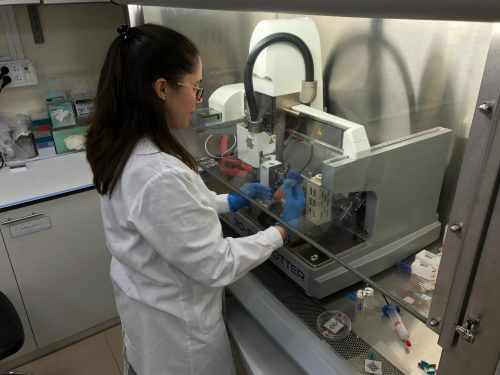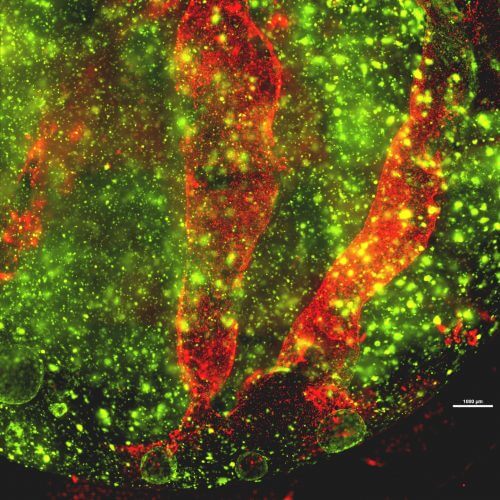Among the winning studies: printing cancerous tumors with XNUMXD technology, growing tissue implants from stem cells and studying melanoma mutations; Over half of the winners are Israeli. The fields in which the graduate students who won the prestigious scholarship are engaged: personalized medicine, bioethics and history of sciences. Some of the studies deal with the development of treatment methods and advanced technologies in the fields of medicine as well as the ethical and political implications of different treatment methods.

DAN-DAVID-STUDENTS-3D printed brain
XNUMXD printed brain in the project of Lena Neufeld, winner of the Dan David scholarship. Photo: Dan David Prize Foundation
20 young researchers, doctoral and post-doctorate students from Israel and the world, won Dan David scholarships for 2018. This year's winners come from three fields of research: personalized medicine, bioethics and history of science. Over half of this year's winners are Israelis.
Lena Neufeld, from the Department of Physiology and Pharmacology at Tel Aviv University, uses her background in materials and polymer engineering to personalize treatment for patients with cancerous tumors. Her research, under the direction of Prof. Ronit Sachi-Painero, uses XNUMXD printing technology in order to produce a model of the tumor from biological materials containing the patient's cells. The model was built using MRI scans, printed on an office XNUMXD printer, and various drugs are tested on it to treat the tumor in order to identify the ideal option for the patient. In the methods that exist today, it is customary to take a sample of the tumor and implant it in laboratory mice, on which the various drugs are tested. This is an expensive and long process that sometimes requires about half a year of waiting until a response is given to the patient. The innovative method offered by Newfeld is not intrusive, it is cheaper and shortens the time of giving the patient the answer significantly - sometimes it is a matter of life and death.
Reuven Adri, from the Department of Microbiology and Biotechnology at Tel Aviv University, researches the use of stem cells and the creation of tissue implants that are perfectly suited to the patient. In this method, stem cells and fat tissues are taken from the patient and combined to create different cells according to the patient's personal needs. The innovation that this method offers is in the creation of the cells within the fat tissue and therefore perfectly matched to the patient and implantation without fear of rejection of the graft. Adri's research deals specifically with growing implants to treat spinal cord and heart damage. So far, the method has been tested on mice with spinal cord injuries, when all of them returned to walking fully after the treatment.
Eran Hudis, from the Department of Biophysics at Harvard University, who was chosen by Forbes magazine as one of the 30 most promising young people under the age of 30 in science in 2015, studies melanoma, one of the deadliest forms of skin cancer. In his research, he investigates the conditions and mutations that lead to the formation of melanoma, on the way to a better understanding of the disease and its treatment methods.
Dr. Tal Arbel, from the Cohen Institute for the History and Philosophy of Science at Tel Aviv University, studies the migration of information in the field of social sciences. Her research focuses especially on how the procedure of polls and surveys became the main way of gathering information in the field of social sciences in the world.
Lisa Lerner, from the Department of Science and Technology Studies at Cornell University, deals in her research, which deals with bioethics, with issues related to biomedicine and the political, economic and moral dimensions of the global drug market and its local implications.
Rosie Lev-Khalutz, from the Cohen Institute for the History and Philosophy of Science at Tel Aviv University, studies the development in the 19th century of non-Euclidean geometry, which forms the basis for the theory of relativity and physical theories after it. This research has broad implications for scientific research in mathematics and physics, and it shatters the concepts we have held about the nature of space in our universe.
The Dan David Award, given in Israel, is currently one of the top international awards. It is named after Dan David, a businessman and international philanthropist, who passed away several years ago. As part of the award, three awards worth one million dollars each are awarded each year to people who have demonstrated special excellence in the fields of science, the spirit, art, public service and the world of business. According to the tradition of the award, the winners donate 10% of the award money to 20 scholarships intended for young researchers in their fields of activity, with each young researcher receiving $15 that will allow him to continue the current research he is engaged in and develop and promote other projects.
The prizes and scholarships will be awarded in a festive ceremony with the participation of the winners, personalities from Israel and the world on May 7, 2018, at Tel Aviv University.


More of the topic in Hayadan:

2 תגובות
The prize is awarded annually for exceptional achievements and a significant contribution to humanity in the humanities, art, natural sciences and business. I assume that the scholarships are also awarded in the same fields
engineering? artificial intelligence? Electronics and aeronautics? The scholarships in question and the award given by the foundation are focused exclusively on the profession of medicine, biomedicine and history
http://www.dandavidprize.org/
The late founder of the fund has the right to choose the field of interest.
Also in medicine - decisive contributions to understanding mechanisms down to the level of DNA and even smaller than that, come from engineers who describe biological systems in a way that life science graduates do not learn how: nonlinear, robust, optimal control, quantum physics, artificial intelligence. In this section, it's a bit of a miss. The late founder of the fund has the right to choose the field of interest.